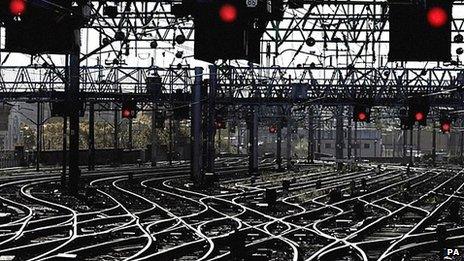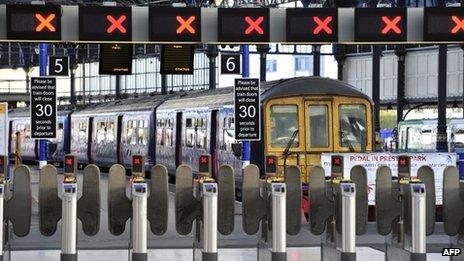Storm cancellations: Were train companies too cautious?
- Published
Footage from in and around London shows disruption suffered by commuters
Train services were completely cancelled across large parts of England on Monday, leaving thousands of people seeking alternative transport. But with companies axing services before the storm had even arrived, were they right to be so cautious?
Hours before the St Jude storm began whipping across the coast, senior figures at South West Trains had made a decision - they were going to cancel nearly all services for the following morning.
As one of the largest train operators - running a train every minute into London Waterloo at peak times - the company had learnt to put its faith in weather forecasts.
This was a pattern largely imitated across most of the country, with First Capital Connect, Greater Anglia, Southeastern and Southern, also cancelling entire services.
Network Rail defended the decision, saying 100 fallen trees had been found on railway lines.
But were rail operators gambling that the weather would be as bad as predicted? And what would have happened had the storm been a damp squib?
Emma Knight, from South West Trains, said that blanket cancellation was "not a decision that we ever take lightly".
"If we hadn't had the weather as predicted we could have tried to reinstate the trains as best we could," she said.
"But if we had gone ahead with normal services, people would have been stuck on trains, and we would have trains and crews stranded all over the place.
"We find the best approach is to be realistic. This way passengers know where they stand."

Trains were nowhere to be seen in many areas of east and southern England
And she said that blanket cancellations had become more common recently.
"In my experience, with some of the extreme weather we've had in the past few years - with really heavy snows and floods - it has become more and more something that has to be done," she added.
However, some commuters found the scale of the cancellations to be less than helpful.
George Thomson, who was stranded at Gatwick, tweeted, external: "Opposite of the British Bulldog spirit, flights on, buses on, but trains all cancelled on Southern Railways lines = over cautious!"
And Stewart Jackson, MP for Peterborough, tweeted, external: "How come a gust of wind disables whole east of England rail infrastructure with economic consequences too?"

Train services across much of England were cancelled before the storm had hit
The storm was forecast to be the worst to hit the country in years with winds gusting over 80mph (129km/h). A gust of 99mph (159km/h) was recorded at Needles Old Battery, Isle of Wight, at 06:00 GMT.
A 17-year-old girl and a man in his 50s were killed by falling trees, while many others were injured on roads and pavements in towns and cities hit by strong gusts.
But there have been no reports of injuries at railway stations or on trains, even though one passenger service struck a tree in Devon.
Roger Perkins, from First Capital Connect, said passenger safety was paramount. The decision on what to do in the event of severe weather is taken jointly as an industry with Network Rail.
"There are various contingency timetables that can be put into effect," he said.
"All the train companies and Network Rail worked over the weekend to see how we could best respond as an industry.
"But there comes a point at which a decision has to be made."
Network Rail said several hundred staff had been working to monitor conditions and react to any damage caused by the storm.
Robin Gisby, Network Rail's managing director of network operations, said: "While conditions were as forecast during the early part of the morning, the damage caused by the storm has been more severe than expected."
- Published28 October 2013
- Published28 October 2013
- Published28 October 2013
- Published28 October 2013
- Published28 October 2013
- Published28 October 2013
- Published28 October 2013
- Published28 October 2013
- Published27 October 2013